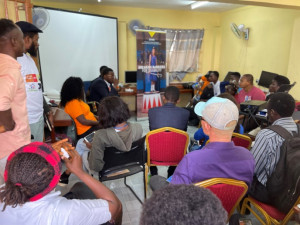By Foday Moriba Conteh
As part of their efforts towards empowering students with disabilities by advocating for their rights and fostering awareness and to identify and address the challenges faced by these students in universities and colleges in the country, One Family People with support from the Liliane Fonds, has Thursday 1st August, 204 concluded focus group discussion among students with disabilities from the University of Sierra Leone.
The focus group discussion, which brought together students with disabilities ,from the University of Sierra Leone, Fourah Bay College (FBC), Institute of Public Administration and Management (IPAM), and the College of Medicine and Allied Health Services (COMAHS) highlighted the significant challenges these students face in accessing higher education, particularly regarding physical accessibility, academic accommodations and social inclusion.
In his presentation, Samuel P.O.V Macauley, Programs Manager at OneFamilyPeople, emphasized the purpose of the focus group, noting that students with disabilities encounter unique challenges that significantly affect their quality of life and participation in society, highlighting the goal of sensitizing tertiary education stakeholders to the potentials, talents and challenges these students face while mapping out effective strategies to address these issues.
The objectives of the discussion, as outlined by Samuel P.O.V Macauley, were to empower students with disabilities by advocating for their rights and fostering awareness and to identify and address the challenges faced by these students in universities and colleges, thereby promoting positive change.
Samuel P.O.V Macauley then encouraged participants to share ideas and suggestions on how higher education institutions can better support students with disabilities to ensure their rights are upheld and their needs are met. This included improving support services, policies and practices within universities and colleges.
The discussion also explored the dynamics of partnership and communication among students, faculty and administration. Samuel P.O.V Macauley emphasized the importance of teamwork in fostering an inclusive educational environment and sought insights on how this collaboration could be strengthened.
Lastly, insights were gathered on practical strategies for raising awareness and creating a culture of inclusion within higher education institutions. Samuel P.O.V Macauley focused on empowering students with disabilities to participate in advocacy efforts, aiming to implement effective advocacy and awareness campaigns to promote disability rights.
Key questions guided the focus group discussion. Firstly, participants were asked about the primary challenges they have faced in accessing higher education, particularly regarding physical accessibility, academic accommodations and social inclusion. This question aimed to elicit specific examples and experiences highlighting the unique barriers encountered by students with disabilities in educational settings.
James Abraham, Senior Admin Assistant for Students with Special Needs at Fourah Bay College commended OneFamilyPeople for organizing a focus group discussion aimed at highlighting the significant challenges faced by students with disabilities at the University of Sierra Leone. The discussion focused on issues such as physical accessibility, academic accommodations and social inclusion.
Abraham pointed out that students with special needs face numerous challenges, including infrastructural and technological accessibility, as well as extra charges. He acknowledged the efforts made by the college administration to address some of these issues but emphasized that much more needs to be done.
He urged other institutions to follow OneFamilyPeople’s example by engaging in direct conversations with students with special needs to gain firsthand insights into their challenges.
James Abraham concluded by calling on all stakeholders to continue the conversation and work towards meaningful change in higher education for students with disabilities.
Gibrilla Kargbo, President of Students with Special Needs at Fourah Bay College, also praised OneFamilyPeople for the focus group discussion, describing it as not only important but also very timely.
He reiterated the challenges faced by students with special needs, particularly in terms of accessibility and the burden of extra charges imposed by the university. These additional costs, he noted, have prevented many students with special needs from completing their registration for the past three years.
Gibrilla Kargbo called on the administration of the University of Sierra Leone to address these challenges, especially the issue of extra charges. He emphasized the need for a more inclusive and supportive environment for students with disabilities, urging the University to take concrete steps to ensure their needs are met.













